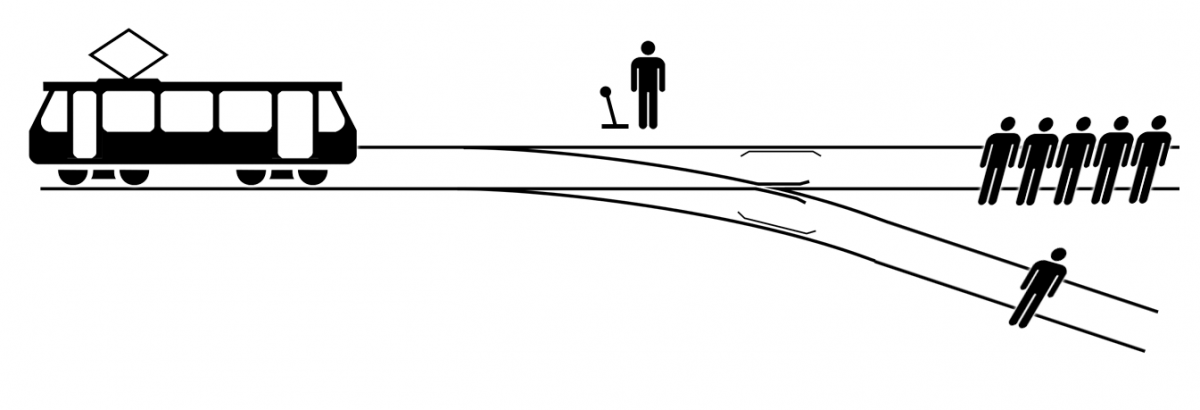How stress influences our morality
All of us are stressed every now and then. There are phenomena we usually associate with stress, like health risks and feelings like fear, panic, or insecurity. But stress might also have effects we normally don’t think of; recent studies suggest it can dramatically influence our decision-making in a number of—perhaps unexpected—ways. This becomes particularly relevant in the moral context: people who are put under stress behave more compassionately in some situations, yet the opposite can be true in other situations. Why is this and what does this tell us about our morality? Maybe the comedian Tim Allen was right, when he said: “You don't know what people are really like until they’re under a lot of stress.”
Consider this dilemma: A trolley is racing down the railway tracks towards five people who cannot escape. You are standing on a bridge under which it will pass. Next to you, as it happens, stands a very large man. By pushing him over the bridge, and thus killing him, you could stop the trolley and save the five people. Should you push the man? This question is tough and people—even philosophers—have very different views about it.
 image source: Wikimedia Commons https://commons.wikimedia.org/wiki/File:Trolley_problem.png
image source: Wikimedia Commons https://commons.wikimedia.org/wiki/File:Trolley_problem.png
The question of the appropriateness of killing someone to save several others has been debated among philosophers for centuries and exemplifies a distinction in moral philosophy between utilitarianism (e.g. Bentham, 1789; Mill, 1861) and deontology (e.g. Kant, 1785). Utilitarianism focuses on the consequences of one’s actions and assumes that the right thing to do is whatever maximizes the wellbeing of everyone. Deontology, on the other hand, prescribes a set of rules that should always be adhered to—to a large extent, independently of the consequences, like the prohibition of murder for example. Hence, in the trolley dilemma above, a utilitarian might push the large man and accept the loss of one person in favor of five others whereas a deontologist would not.
In the last decade, scientists have started to explore the underlying psychological mechanisms involved in such moral judgments. Psychologists often measure people’s moral tendencies by having them judge hypothetical moral dilemmas such as the trolley scenario. Let us first take a closer look at how moral psychologists explain the psychological mechanisms involved in moral judgments. Thereafter, we will have a look on how stress influences these judgments.
Automatic and controlled moral judgments
Moral psychologist Joshua Greene proposed a dual-process theory of moral judgment, suggesting that we have two competing moral subsystems (Greene, Nystrom, Engell, Darley, & Cohen, 2004). The theory is analogous to Daniel Kahneman’s more general “thinking fast and slow” or System 1 and System 2 assumption (Kahneman, 2011). In a nutshell, the dual-process theory of moral judgment assumes that deontological judgments are mainly driven by fast, automatic, and emotional intuitions (gut reactions), whereas utilitarian judgments usually involve slower and more controlled reasoning. When people are faced with a “personal” dilemma—one that, like the trolley dilemma, involves physically harming someone—a strong negative emotional reaction is provoked resulting in characteristically deontological judgments (Greene, 2007). Nevertheless, we can also switch to a more controlled mode of thinking in order to overcome this first gut reaction and perform a deliberative assessment of the situation, e.g. a utilitarian cost-benefit analysis of the anticipated consequences.



From the editors
Lucius Caviola and Nadira Faulmüller do a great job showing the complex relationship between being stressed and being a good person. They provide the one answer that will be bound to deflate those action-oriented managers, coaches, or policy-makers out there: it depends. But it's a great answer, one we should acknowledge more often. In psychology, few effects, if any, are true in all cases. Most will depend on the situation or the individual.
But here's one of the very practical ways in which the "it depends" answer is very interesting - societal debates about moral decisions. If different people in different situations react differently - we can begin to understand why conflicts arise over social moral issues. Let me give you some examples of how different types of moral reasoning (outlined above as pathways in the dual process model) create societal debates and disagreement. One example are debates over public health spending. When treatment for a specific condition suddenly becomes very expensive, elaborate moral reasoning may suggest shifting resources away from the expensive treatment to cure other conditions and save more lives. An emotional reaction may, however, suggest that it is just wrong for people with a certain condition to not be supported at all. Another example that sadly comes up much too often in recent years is military intervention. An utilitarian argument may be that it's right to intervene in a conflict zone - although the intervention would cause loss of lives, more lives would be saved in the long-term. However, the 'moral gut-feeling' reaction, as the authors call it, may be that any war is just wrong.
As the authors mention, none of the arguments above is 'right' or 'wrong', this will depend on your ethical standpoint. What seems interesting is that stress, in its many forms, may affect these moral debates by making people more likely to accept one argument over the other.
What do you think about this? Can you think of other such debates over moral issues? Do you think that stress could be a useful variable to understand how moral debates play out in society?
Diana OnuAssociate Editor